If you’re passionate about helping people and working for a worthy cause, starting an NGO or even working for one is probably on your mind.
And since NGOs are in the business of helping people, they themselves have to be especially legally protected.
NGOs and non-profits don’t generate revenue like Private Limited Companies or Partnerships. Instead, they operate on donations and funds.
This means that they have to be twice as more accountable and legally compliant than any other business type out there.
But how does an NGO do that?
For starters, you will need to register your NGO in Sri Lanka.
This is the most basic and important step in protecting your NGO.
However, registering an NGO in Sri Lanka can be a little tricky.
This blog will walk you through the entire registration process step-by-step
An NGO or a Non-Governmental organisation is a voluntary citizens group. They can function on a local, national or even international level.
Their main intention is to find solutions for issues faced by a target group of people. By finding these solutions and executing them, NGOs serve the public.
You might have heard about the very popular international NGO like the Red Cross or Amnesty International.
In Sri Lanka, organisations like Women in Need or Save the Children exist.
NGOs in Sri Lanka are under the National Secretariat for Non Governmental Organizations.
In addition, they’re also guided by the Voluntary Social Services Organizations (Registration & Supervision) Act.
They’ve defined what it will take for you to qualify as an NGO:
In summary, your NGO should:
For example: An NGO can have a budget and receive funding from a Government institute for a specific set of objectives. However the Gov. institute cannot get directly involved with the actions or oversee decisions carried out by the NGO.
Your NGO will classify as either:
Operational NGOs work on small changes through specific projects;
Campaign related NGOs aim for large changes by influencing the political system. For example, there are NGOs like research institutes. These research institutes work to increase knowledge and public understanding of issues.
Before the 1990s regulations were pretty relaxed on NGOs. However, this made the public very concerned about the misuse of funds.
Due to this, the Sri Lankan government created laws to regulate NGOs. These laws required NGOs to register and work within the framework of Government policies.
This might make you feel a little uneasy about running an NGO – but there are pros to this.
Having your NGO registered gives it credibility and security because all your work is audited and within the legal framework.
This makes it easier for your NGO to receive funding and donations by donors as well.
In Sri Lanka, registering an NGO is a two part process:
Part One: Incorporate your organization as a Company Limited by Guarantee (CLG)
Part Two: Apply to register your Company Limited by Guarantee (CLG) as an NGO
A Company Limited by Guarantee (CLG) or a Limited by Guarantee Companies are mostly formed by non-profit organizations to:
When the company has its own legal identity, it protects both you and other stakeholders.
As a result of this yours and your stakeholders’ personal finances won’t get involved in the work of the company.
When you incorporate a CLG, it’s owned by guarantors who agree to pay a set amount of money if there is a company debt.
However, there are no shares or shareholders in the company.
The term ‘limited’ also helps build trust and confidence in investors.
In addition, it gives your company professional credibility.
Let’s look at how you can incorporate a Company Limited by Guarantee.
This is technically called an “incorporation of an entity as a company limited by guarantee”.
It’s done through the Department of Registrar of Companies (ROC).
Your company will become a distinct legal entity once it’s registered.
Having a distinct legal entity will separate it from you and its owners.
So in a court of law, your Company Limited by Guarantee will be seen as a separate entity from you and its other owners.
Every company needs to have a unique name.
But how can you know whether your company’s name is unique or not?
To do this, you can head over to the official website of ROC and search for the name you have chosen.
You can also check your company name’s availability here.
Once you verify that your company name is unique; you will need to reserve it.
In order to do this, you will have to either create an account with the ROC or login.
Once you do, click on “Name Reservation” and reserve your company’s name.
When you reserve your company name, it will only be valid for 3 months from the date of application. You need to incorporate your company within this time.
If you’re unable to register your company within three months, you will have to request a renewal.
This renewal also must be applied for another period of 3 weeks.
In addition, According to the Companies Act No. 7 of 2007, the articles of association of a company limited by guarantee need to include:
Once you have both your objectives and articles of association drafted, you should submit them to the Registrar of Companies for approval.
Useful reading material: Here’s how you can draft your Articles of Association the right way
As you submit your objectives and articles of association to the Registrar, you need to also publish them in at least one newspaper in all three languages.
Remember, you should not wait for the Registrar to approve your objectives and articles in order to do this.
After you publish them, anyone with reason can object to your articles of association within 21 days.
If there are no objections, you can proceed to the next step.
After you get your company name approved, you will need to complete and submit:
1. Form 05
2. Form 18
3. From 19
to the Department of Registrars (DRC).
We’ve listed and compiled them down below for you along with their prices:
| Document | Price | Attachments |
| Form 05 – Application of Incorporation | Rs. 30 000.00 + VAT (8%) | Please use the eROC system generated forms for Form 05 |
| Form 18 – Consent of Directors | Rs. 2000.00 + VAT (8%) x No. of Directors | You can find Form 18 at: Download Forms – Department of Registrar of Companies |
| Form 19 – Consent of Secretary | Rs. 2000.00 + VAT (8%) | You can find Form 19 at: Download Forms – Department of Registrar of Companies |
Remember, you need to make sure that these forms are printed.
The DRC doesn’t accept hand-written forms anymore.
Once the Registrar approves your articles of association, submit two copies of your approved articles along with Forms 05, 18, and 19.
This will cost you Rs. 2,000 + VAT (8%).
This is the final step in registering a Company Limited by Guarantee.
Once the ROC approves your documents, they will issue a Certificate of Registration and a Business License.
Afterwards, they will publish the:
in the Gazette and at least one newspaper in all three languages.
Have more questions about registering as an NGO? Talk to us!
Once you’ve incorporated your Company Limited by Guarantee, you need to register your NGO under it.
To do this, you’ll need to make an application to the National Secretariat for Non-Governmental Organisations (NS-NGO).
This can be done online in 10 steps.
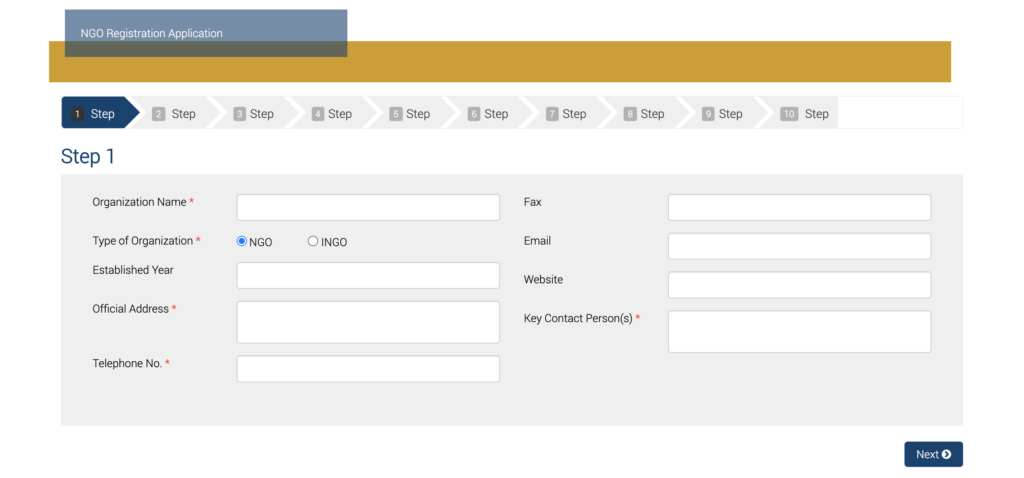
Remember: since you’re registering a local based organisation; it will fall under NGO and not INGO (International NGO).
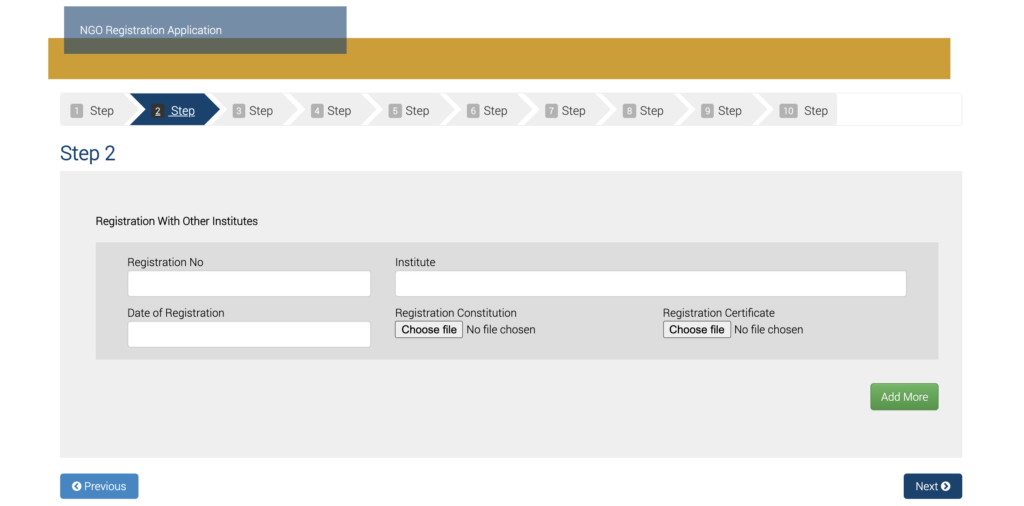
You only have to complete this step if your NGO has already been registered with another institute.

The objectives of your NGO have to be very specific. They will also need to explain what your organization will try to accomplish through its work.
You will need to include your office bearers:
i. Name
ii. Designation
iii. Period of work
The geographic coverage is basically the areas of the island that your organisation covers or reaches.
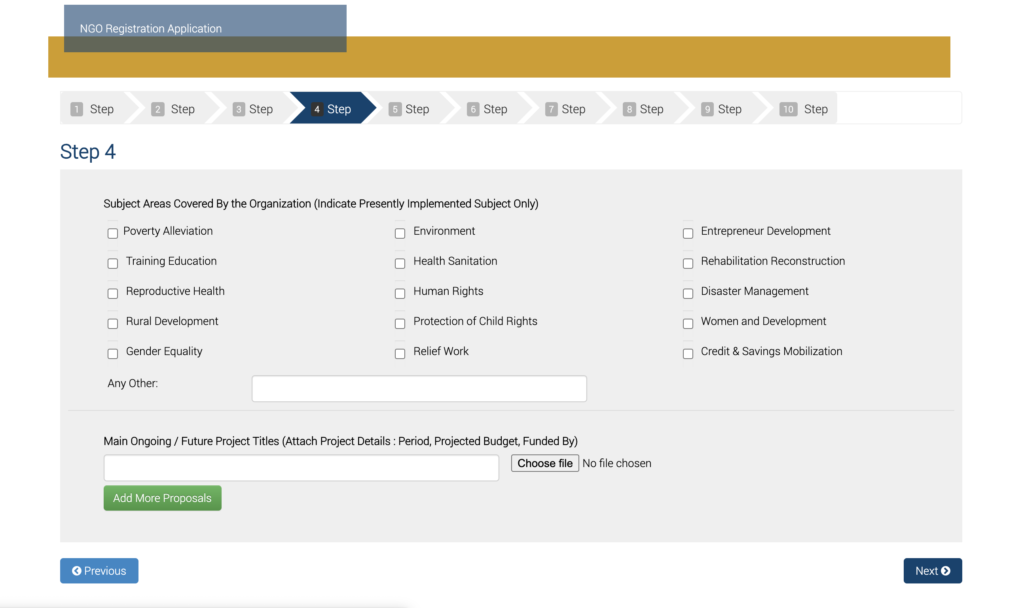
You need to tick the boxes in front of the subject areas your NGO is covering.
If you can’t find your subject area in the box, you can mention it on the “Any other” section of the page.
You can select more than one subject area to clearly elaborate what kind of work your NGO is currently involved in.
In addition, you can also upload project files for ongoing or future projects by your NGO. The document has to include project title, time period, projected budget and mention how the funds are received.
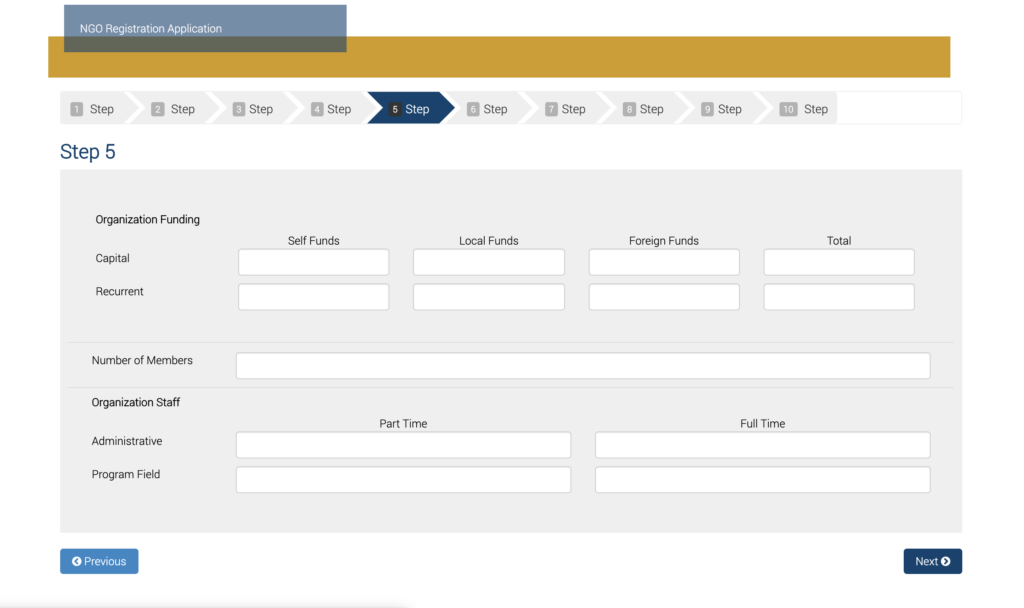
You need to fill three types of information in this step:
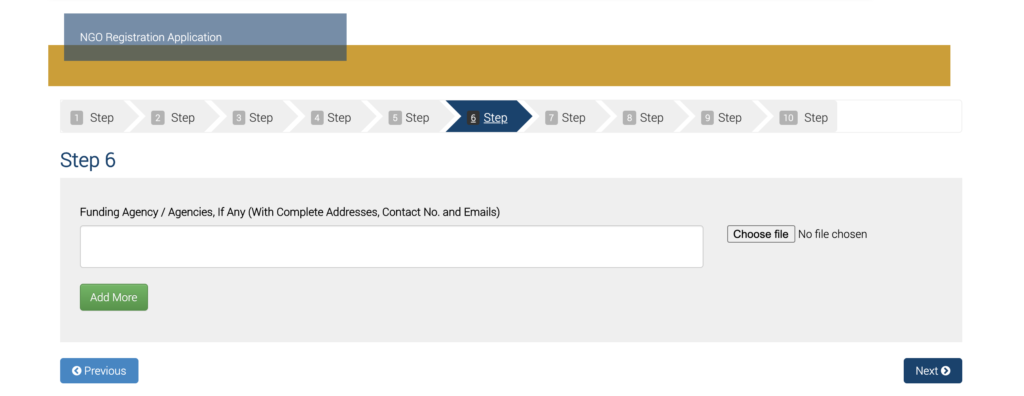
If your organisation is currently working with any funding agency, you will have to upload documents with their contact information such as complete addresses, contact numbers, email addresses.
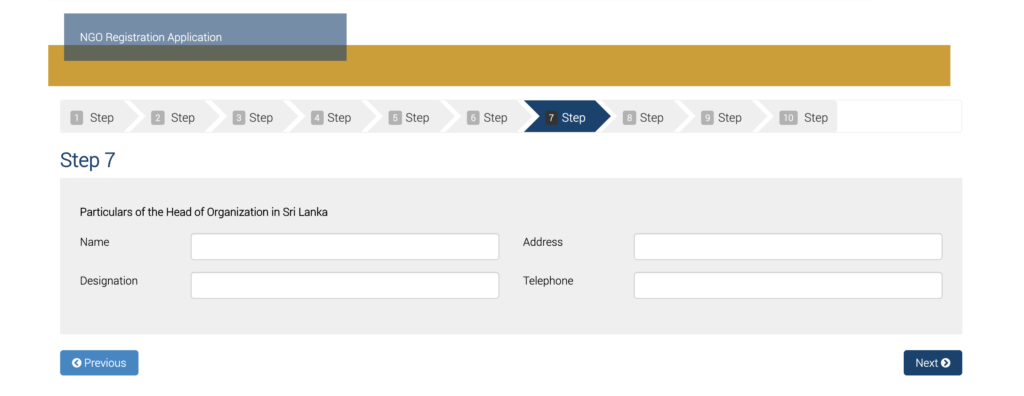
You need to include the Head of the organization’s:
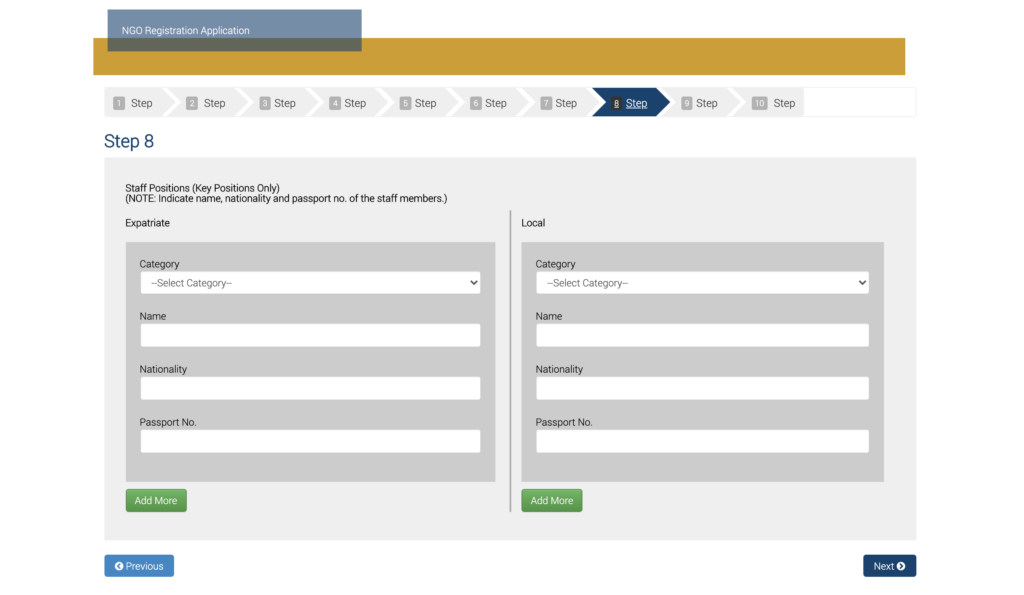
Your organization will have some staff positions that are important to the proper function of your NGO.
They can either work:
The information of the individuals taking up those positions must be included, with their names, nationality and passport number.
There are two categories each for expatriates and locals.
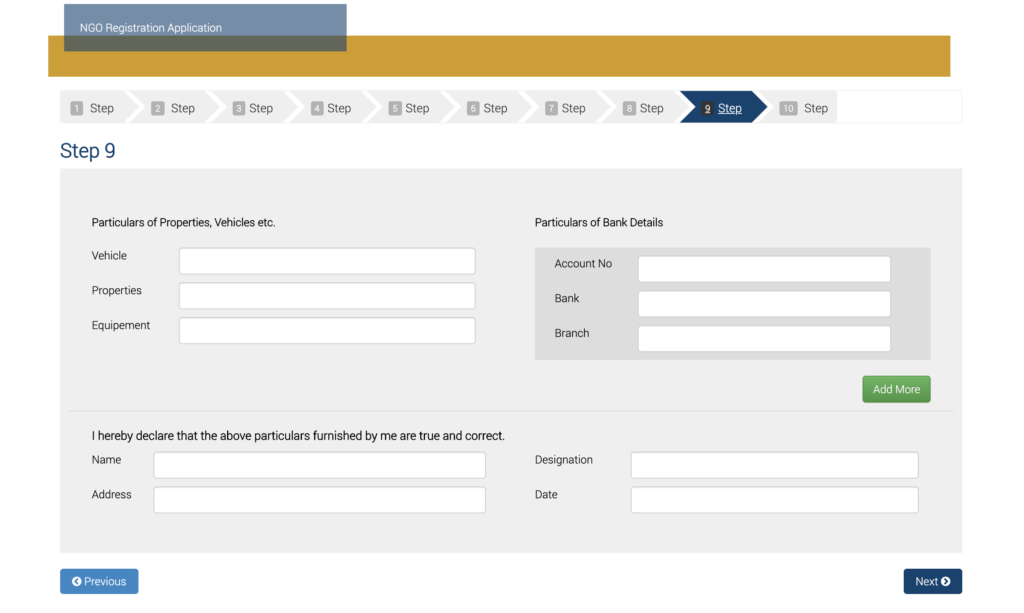
You will need to mention:
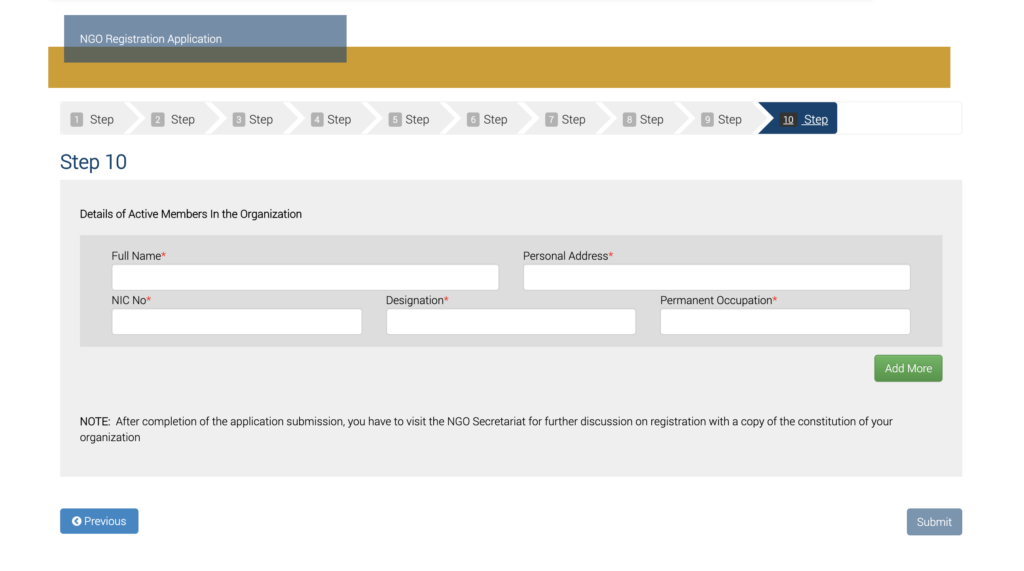
This is the final step in the application!
You will need to mention the details of the active members in your organization.
The details are:
Once you have completed the forms, click Submit!
You’re almost done! The last step is to visit the National Secretariat for NGOs. for further discussions on the registration with a copy of the constitution of your organization.
A constitution is a set of rules on how your organisation will operate. These are legally binding, meaning if one of the rules are not followed, legal action can be taken as a solution. It also outlines the roles, responsibilities and powers of the management and members.
After submitting the application, you will have to wait around 4-5 months.
During this time, the Secretariat will forward your application to the Ministry of External Resources and Ministry of Defence for approval.
Remember to make sure that the administration of the NGO goes in line and supports the non-profit causes you carry out!
After you register your NGO, you will need to follow a few legal processes like:
It is important to document every record of a financial transaction in your NGO.
This requires a level of knowledge in accounting, so you can always hire an expert by outsourcing this job.
An audit works like an independent investigation on all the activities done by your NGO.
It is a good way to show transparency in the financial statements.
Not every activity under your NGO will require tax returns, so this works in a case by case scenario with the type of work you wish to do.
You can clarify these details with the Secretariat before you carry out your events.
To prove that your NGO is still running, you have to file “annual returns” every year.
You can technically register your NGO by following the above steps.
However, if you need further support or want a professional to do the job for you – Simplebooks is here to help!
We are a registered corporate secretary which means we can help you register your organization for you.
A Non-Governmental Organization (NGO) is an organization with volunteers organized on a local, national or international level to find solutions to specific social or political issues.
Through this the aim is to find solutions and provide a service to the public.
It can either be an operational NGO where work is done on small changes through specific projects or it can be a campaign related NGO, where large changes are focused through influencing the political system.
NGO registrations are done in two parts:
This process is called the incorporation of an entity as a company limited by guarantee done with the Department of Registrar of Companies, (ROC). This helps to keep your company as a distinct legal entity, separate from the owners and responsible for their own debts.
The second part is about registering your NGO under your company limited by guarantee with an application made to the National Secretariat for Non-Governmental Organizations (NS-NGO). This process is also available on their website and the e-application only takes ten steps for completion, check it out via: NGO Registration Application
A group of volunteers can come together to create an organization. You must make sure that your organization fulfills the following criteria for it to be an NGO:
Once you register your NGO you will be able to obtain a registered bank account under your NGO for your financial purposes. This will make it easier for you to request for donations and carry out fundraisers for your NGO.
To form an NGO you need to first make sure that you have a group of active members as volunteers and that, your organization has:
Next step would be to register the NGO under the legal procedures.
The steps are not limited to these, but it’ll definitely get you started:
You can invest in fundraisers in the community, work together with corporate organizations and Government institutes or write to grant donors that can support your work. Your NGO can write applications for grants by donors from national or international funding organizations, to receive funds for specific projects and work.
An NGO cannot have only one member. It needs to have a group of volunteers being a part of the work.
They do not have a share capital or shareholders. Instead, it has members who act like guarantors. Guarantors agree to pay a set amount of money towards the companies’ debts. However, they do not have shares in the company.
Registering your NGO gives it credibility and also security, because all your work is audited and within the legal framework. This makes it easier for your NGO to receive funding and donations by donors as well.
Through the online registration system, e-Registration of companies (e-ROC) you can register your organization as a company limited by guarantee. Next you can also carry out the NGO application online through ten steps at NGO Registration Application.
However, after you submit the online application you will have to visit the National Secretariat for NGOs with the constitution of the NGO for further discussions.
A Non-Governmental Organization (NGO) is an organization with volunteers organized on a local, national or international level to find solutions to specific social or political issues.
Through this the aim is to find solutions and provide a service to the public.
It can either be an operational NGO where work is done on small changes through specific projects or it can be a campaign related NGO, where large changes are focused through influencing the political system.
NGO registrations are done in two parts:
1. First register as a Company Limited by Guarantee
This process is called the incorporation of an entity as a company limited by guarantee done with the Department of Registrar of Companies, (ROC). This helps to keep your company as a distinct legal entity, separate from the owners and responsible for their own debts.
2. Second apply to register an NGO with the National Secretariat for NGOs
The second part is about registering your NGO under your company limited by guarantee with an application made to the National Secretariat for Non-Governmental Organizations (NS-NGO). This process is also available on their website and the e-application only takes ten steps for completion, check it out via: NGO Registration Application
A group of volunteers can come together to create an organization. You must make sure that your organization fulfills the following criteria for it to be an NGO:
– Non-Governmental (works independently from the Government)
– Has to be not for profit (will not work towards creating profit in the organization)
– Organization will rely on public contributions, charities, grants or donations to function
– Has its main objectives as an organization
Once you register your NGO you will be able to obtain a registered bank account under your NGO for your financial purposes. This will make it easier for you to request for donations and carry out fundraisers for your NGO.
To form an NGO you need to first make sure that you have a group of active members as volunteers and that, your organization has:
1. Clear objectives of how it will help the public
2. No purpose of making profits
3. Its work independent from the Government
Next step would be to register the NGO under the legal procedures.
The steps are not limited to these, but it’ll definitely get you started:
1. Select a cause that you think is necessary to bring change to the lives of people in society.
2. Mobilize or find a group of people to support this cause and be a part of this group to volunteer.
3. Come up with clear objectives and a vision for your organization
4. Register your organization as an NGO
5. Carry out the relevant work to achieve the objectives while maintaining accounts of all your work.
You can invest in fundraisers in the community, work together with corporate organizations and Government institutes or write to grant donors that can support your work. Your NGO can write applications for grants by donors from national or international funding organizations, to receive funds for specific projects and work.
An NGO cannot have only one member. It needs to have a group of volunteers being a part of the work.
A Company Limited by Guarantee (CLG) is a public company which is formed to benefit the community. They do not have a share capital or shareholders. Instead, it has members who act like guarantors. Guarantors agree to pay a set amount of money towards the companies’ debts. However, they do not have shares in the company.
Registering your NGO gives it credibility and also security, because all your work is audited and within the legal framework. This makes it easier for your NGO to receive funding and donations by donors as well.
Through the online registration system, e-Registration of companies (e-ROC) you can register your organization as a company limited by guarantee. Next you can also carry out the NGO application online through ten steps at NGO Registration Application.
However, after you submit the online application you will have to visit the National Secretariat for NGOs with the constitution of the NGO for further discussions.